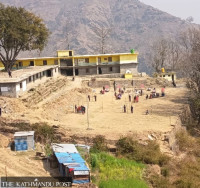National
Ruling parties in Madhesh divided over project implementation methods
Dispute arises whether development works should follow competitive bidding or consumer committee approaches.
Santosh Singh
The ruling coalition in Madhesh Province is divided over the method of implementing provincial government projects, with some parties advocating for competitive bidding while others support execution through consumer committees.
Although the province’s policies and budget statement emphasised conducting large-scale development projects through open competitive bidding and transferring smaller projects to local governments, differences have emerged within the coalition.
The Janamat Party-led government had initially aimed to implement projects transparently by adopting competitive bidding to prevent irregularities, halt project trading, and ensure quality construction work. However, disagreements among coalition leaders have stalled progress.
Janamat Party parliamentary leader in Mahesh, Yadav explained that discussions during a coalition meeting convened on Friday by Nepali Congress leader Krishna Prasad Yadav focused on the government’s responsibilities.
“Leaders proposed that smaller projects should be implemented through consumer committees, while the budget framework prioritised competitive bidding. The meeting ended inconclusively,” Yadav said.
The coalition meeting included leaders from the Nepali Congress, the CPN-UML, the Loktantrik Samajbadi Party, and the Janamat Party.
The province’s policy document (Clause 21) and budget statement (Clause 147) stress the implementation of development projects via open and competitive bidding to ensure transparency and foster a sense of ownership among beneficiaries. Small-scale public construction projects are to be executed through local governments, with citizen-led facilitation mechanisms enhancing transparency.
However, the Ministry of Physical Infrastructure Development has prepared guidelines to implement projects through consumer committees, disregarding the policies passed by the provincial assembly. These guidelines, approved by the Ministry of Finance, have further deepened the division within the coalition.




 25.15°C Kathmandu
25.15°C Kathmandu















